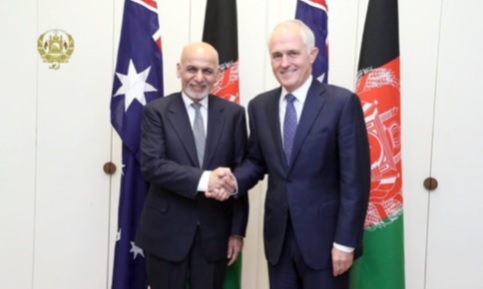DIPLOMATIC HISTORY
DIPLOMATIC HISTORY
Afghanistan and Australia enjoy a long-standing history of friendly and cooperative bilateral relations. Relations can be traced back to the 1860s when the Afghan cameleers came to Australia. For half a century, the cameleers played a crucial role in the exploration and development of the Australian outback, ferrying supplies across the continent. The Ghan is named in their honour.
The first diplomatic link between Australia and Afghanistan was established in March 1969, when a non-resident Australian Ambassador was accredited to Afghanistan. In October 1994, Afghanistan opened an honorary Consulate in Canberra with jurisdiction throughout Australia.

ArtLords mural: “A friendship since 1860 Afghanistan – Australia”
Credit: ArtLords and Australian Embassy in Afghanistan
In October 2001, after the September 11 attacks on the World Trade Centre, the then Prime Minister of Australia John Howard committed military personnel to Afghanistan.
Following a long hiatus during the period of civil conflict in Afghanistan, Australia and Afghanistan re-established diplomatic representation in 2002. The Embassy of Afghanistan in Australia was established and the first resident Afghan Ambassador was accredited to Australia.
In 2006, the first resident Australian Ambassador to Afghanistan was appointed and Australia inaugurated its Embassy in Kabul.
In 2012, Afghanistan and Australia signed a Comprehensive Long-term Partnership Agreement. Building on their existing record of cooperation, the Governments reaffirmed their shared vision to work together to address long-term transnational threats, including terrorism, narcotics, people smuggling and organised crime; achieve improved development outcomes for Afghanistan; enhance bilateral business relations and investment; cooperate on migration and humanitarian issues; and foster cultural and people-to-people links.
Afghanistan and Australia promote high-level visits and dialogue between the two countries for the purpose of developing and enhancing bilateral cooperation on issues of mutual interest.
In April 2017, President Ashraf Ghani visited Australia, marking the first visit to Australia by an Afghan President in the history of Afghan-Australian political relations. The historic visit underscored the growing partnership between Afghanistan and Australia and was a valuable opportunity to discuss ongoing security and development cooperation.
During this visit, both Governments signed a Memorandum of Understanding for the Afghanistan-Australia Development Partnership 2017-2020. The MoU establishes the shared vision of both Governments to work together to build a strong, stable and self-reliant Afghanistan and focuses on the areas of empowering women and girls, economic infrastructures, dry land farming and water management, mining and training for civil servants.

President Ashraf Ghani with Prime Minister Malcolm Turnbull during President Ghani’s visit to Australia in 2017
The MoU reaffirms the commitments made at the 2016 Brussels Conference on Afghanistan http://mfa.gov.af/en/page/the-brussels-conference-on-afghanistan including Australia’s commitment to maintain an $80 million aid program to 2020, and Afghanistan’s commitment to progress electoral and security reform, tackle corruption and uphold human rights, especially for women and children.
Australia is a long-standing partner to Afghanistan and has provided over AUD$1 billion in development assistance since 2001. Australia's aid program in Afghanistan focuses on achieving three strategic objectives which are detailed in the DFAT Afghanistan Aid Investment Plan.
• Objective 1: Supporting the Afghan Government to maintain economic growth and institute more effective and accountable governance,
• Objective 2: Empowering women and girls by addressing barriers to their social, political and economic participation,
• Objective 3: Building resilience and supporting at-risk populations.
A new agreement between Geoscience Australia and the Afghanistan Ministry of Mines and Petroleum was also signed in April 2017 to strengthen scientific and technical cooperation in Earth Sciences to help advance the sustainable management of Afghanistan’s energy, mineral and water resources.
Soon after President Ghani’s visit, Prime Minister Malcolm Turnbull visited Afghanistan. Prime Minister Turnbull met President Ghani and Chief Executive Abdullah to discuss Afghanistan’s political and security outlook, and met Australian Embassy and Defence Force personnel working in Kabul.
25,000 Australian troops have served in Afghanistan since 2001, mainly in the Uruzgan province. 42 Australian soldiers have lost their lives in Afghanistan. Australia has extended its US$100 million annual commitment to the Afghan National Army and the National Police (ANP) until 2020. Australian commitment includes a US$80 million contribution to the Afghan National Army Trust Fund and a $20 million contribution to the Afghan National Police.
In December 2017, Afghan Deputy Foreign Minister Hekmat Khalil Karzai and Australian Deputy Foreign Minister Penny Williams co-chaired the first annual political consultation meeting between Afghanistan and Australia which was held in Canberra. The next annual political consultation meeting will be held in 2018.
The first Afghan-Australian Parliamentary Friendship Group was also inaugurated in December 2017 at the Australian Parliament House, Canberra. Liberal MP Andrew Wallace was selected to be the Chair of the group and Labor MP Julian Hill was selected to be Co-Chair. 24 Australian parliamentarians have registered as members of the group.
Throughout these official visits and the successive decades, the Australian-Afghan partnership has continued to grow, opening the way for new advancements for both states. In Afghanistan, projects to improve infrastructure and educational opportunities have flourished. Today, the Afghan Embassy in Australia and the Australian Embassy in Afghanistan are both dedicated to working closely with their respective governments in private and public sectors to further improve economic, military and technology relations between the two countries.
The current Afghan Ambassador to Australia, His Excellency Mr Wahidullah Waissi, presented his credentials to His Excellency General the Honourable Sir Peter Cosgrove, Governor-General of the Commonwealth of Australia, on 1 March 2017. Ambassador Waissi also serves as a non-resident Ambassador to New Zealand.

